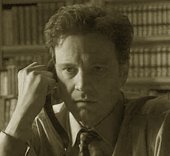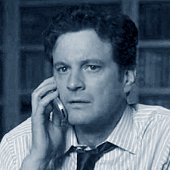| Firth
and Foremost
Dashing British leading
man Colin
Firth opens up about Bridget Jones, Tony Blair, Mick Jagger, and much
more.
Considering his nearly 20
years in
the business, two Oscar-winning movies (Shakespeare In Love and
The English Patient), and big-time blockbuster success
with Bridget
Jones’s Diary, you would think Colin Firth would be a household
name
in the US. Rather, he’s still best remembered as the man who hit Hugh
Grant
in the kisser over the winsome Ms. Jones. This month, his latest movie,
What a Girl Wants, starring Amanda Bynes, hits theaters
nationwide.
“He’s one of the nicest people I’ve ever worked with,” says Bynes. “He
brings so much to his character and the film.” When we sat down with
the
first gentleman of the screen, he shared his thoughts on playing
British
stereotype, concealing rage, and speaking one’s peace.
What does it feel like
to be constantly
pegged as the successful yet repressed and uptight British man?
It’s a paradox really. I
realize
that it looks that way from the outside, though I’m not seeing it so
much
myself. It’s been lingering since Darcy [his acclaimed, career-making
performance
in the BBC’s production of Jane Austen’s Pride and Prejudice].
I
don’t mind it really, being typecast as British. When you are British,
it doesn’t feel like being typecast at all.
If you were to play
off type,
what kind of roles would you most desire?
I’m about to do a film about
a man
suffering a nervous breakdown, which will be welcome new terrain. This
recent picture, What A Girl Wants, is a return, I guess, to
previous
material, but it’s a fairy tale. I like to think that the cinema holds
a place for dreaming, for escapism...I wouldn’t want to be always in
that
area, and at times there was a sentimentality that I resisted, but for
that moment it was satisfying. The desire to be truthful and the desire
to be too austere compete with one another. This was, after all, a
movie
for teenagers.
What happens when you
sign on
for a film, get halfway through it, and realize it’s a dog?
I’m very used to making the
wrong
call on things. I guess my instincts aren’t that good on that. Nobody’s
are, or else we would all be making masterpieces. You can cut eight
different
movies from what you shoot, and often your vision of a project is not
in
line with the director’s. I think the reverse is also true; I
have
seen beauty come from what I thought was rubbish.
It’s been rumored that
you had
a hand in convincing Renee Zellweger to reprise her role in Bridget
Jones’s Diary.
No, I don’t know where that
got
out. It’s entirely not the case, and I suspect she is capable of making
her own decisions.
When the movie
industry thinks
sequels, we often get paltry versions of a quality original. What was
your
reaction when Bridget Jones 2 was brought to the table?
In the abstract, my thoughts
were
quite negative. The word sequel conjures up dreaded thoughts. You ask
yourself
do you want to do a sequel about something you’ve already done? But
then
you read the story, and if the script transcends your skepticisms, you
find a new affinity for it. In some respects, revisiting a familiar
character
is quite attractive to me. I’m not drawn to characters by how much they
require a transformation. That might sound like an unusual thing for an
actor to say, but what concerns me most is telling a story truthfully,
not using a funny accent or changing my walk. Getting deep into
characters
can be relentlessly interesting.
One quality your
movies have shared
is managing to reach the heartstrings of women. What do you think women
find so attractive about you?
I have no idea. I’d fall
into all
kinds of traps if I was to speculate on that matter. I suppose it’s
inherent
in the qualities my character possess. There is something charming when
you see one thing but suspect something is bubbling underneath; the
substance
below becomes more alluring, more erotic for that reason. Many of my
characters
have personified that duality. In the same respect, such qualities
endure
simply as an English archetype. I had some Italian friends over here on
a visit, and they couldn’t understand it. They thought if I was
perceived
as sexy, then who else? Does that make John Major sexy?
There is something
subtle to your
portrayals of men that goes beyond mere repression.
I look for twists. It isn’t
just
repression. They have to have a simmering below, a discomfort. You have
to find it in the character. I find that what blocks people, their own
limitations, most intriguing.
Is there a future for
the English
gentleman, or is that character a dying sentimentalism?
The English are an extremely
polite
people, but their reserve—this notion of the English gentleman—is a
fairly
recent ideal, only a few hundred years old. We have an enormous history
of warfare, a high record of violence at home, we’re oversexed, like to
drink a lot—all of which stems from the fact that there is a great deal
of passion underneath. The archetype is now breaking down quite
significantly
with the past generations. Especially Mick Jagger and John Lennon.
Those
are the guys I want to emulate. The rock-and-roll culture still looms
large.
How does English
manhood compare
to American manhood?
I think they are probably
identical.
Whenever I try to differentiate them, I can always think of an
exception.
There are macho jocks, sensitive poets, neo-fascists, and
men’s-movement
guys in both countries. Cliches tend to rule in movies. The one
prevailing
one is that every boy who ever went through English public school is
gay.
Actors in the US have
largely
been quiet about their dissent regarding the potential war against
Iraq,
in part because many fear that being too political will kill their
careers.
For an actor with notoriety, is the climate in Britain any
easier?
Do you hesitate to speak your mind on matters of politics?
Yes. It is, period, easier
to speak
out in England. Although I have noticed it is easier now than 18 months
ago in the US. I think the debate is far broader over here; the issues
get explored further. The acting community is fairly quiet, it does
seem,
but not silent. It’s quite challenging to speak you mind on causes as a
celebrity. You’re met with hostilities, as in “What gives your opinion
any more weight than mine?” Or “What makes your opinion any more
qualified?”
But ultimately I decided I have opinions about it just as any citizen,
and I need to share them. Having some celebrity, in the end it is
pretty
damn useless in the scope of changing world affairs. Being a
businessman
would probably be far more influential.
On that note, since
when did England
become the butler to whomever sits in our oval office?
It is the rather prevailing
view,
especially articulated by our political cartoonists here, but even
Nelson
Mandela has said likewise. It was very worrying, yes, that [Tony Blair]
has tailored his policies so absolutely to the US, but then it is also
quite uncomfortable, as you can see with Chirac, to take a position
against
the US.
Do you have a temper?
Yes. Acting is frightening;
it is
a very scary thing to do. It requires a bit of aggression, actually.
For
a child it is a perfectly natural thing to do, but not for an adult.
There
are all kinds of motives you can use to get to the point where you have
the ability to pretend in front of others. Acting is something in which
vanity will help you a lot. I’ve heard it said that to combat his stage
fears, Lawrence Olivier used to insult the audiences in the wings
before
he would go on. I can understand that sort of impulse, above it being
purely
mechanical, as a technique.
Can you imagine your
life today
if you hadn’t found acting?
I could be living in a
cardboard
box, flipping burgers. I could have been locked up by now...I don’t
know
if I could see myself being successful at anything conventional. I
didn’t
shine at school. I certainly feel fortunate for it.
|














|













